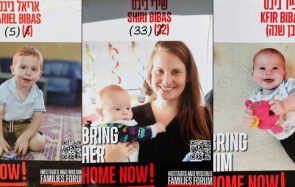When I first met my husband, we liked each other almost immediately. We’re both very intense people, and after a few dates, we knew each other’s kishkes (guts) as if we’d grown up together. But there was one thing that really bothered me, and that I couldn’t rightly ask him to change—his last name.
I grew up with one of those standard, obviously Jewish last names: Eisenberg. Even though I had a regular old American first name (Chana is my Hebrew name; my legal name outside of Israel is Anna), my last name proudly branded me, wherever I went, as Jewish. And if I married this guy, well, I was going to have to give that marker up. Forever.
My husband’s parents both converted to Judaism, leaving him with a last name, Roberts, that’s as typically Christian as Eisenberg is typically Jewish. I didn’t feel right asking him to change his name and take mine.
This inner debate continued for some time, until my husband-to-be mentioned that he didn’t really like his last name. It didn’t sound Jewish enough. What would happen if he took my name, instead of the other way around?
I was surprised, to say the least. I hadn’t said a word about my thoughts on the matter. I felt awful, as if I’d somehow let him know my misgivings. (As it turns out, this was something that had bothered him, even before we met.)
Through his question, I found my answers. He’d put me on the spot, and I had two choices: Let him know that I agree, or make him feel better about his last name. “Roberts” didn’t have to be a part of my identity, but it would forever be a part of his. I didn’t want him to feel bad about his family’s heritage, and I certainly didn’t want to reinforce his negative feelings about his own name.
So, I lied.
I told my husband-to-be that I thought his non-Jewish last name is a badge of honor. It shows that his parents are converts, and that’s not a simple thing. They’d put a lot of effort into becoming Jews, and had made a lot of sacrifices on the way. His parents were proud of him, and to see their only religious son (the rest became non-religious along the way) change his name would hurt, a lot.
He didn’t believe me at first. Neither did I, honestly. My explanation sounded hollow and fake, but I knew it was the truth, so I stuck with it. When he asked if I really meant what I’d said, I lied again and said yes. In the end, he made peace with his last name. And gradually, through convincing him that I meant what I’d said, I made peace with his name, too.
One of the other things that helped was the knowledge that Roberts had been shortened from Robertson, and that my husband’s family is descended from Scottish royalty. Clan Robertson had been “demoted” only after Clan Stuarts seized their lands, and later the throne, by force. I truly have no interest in being queen of the UK, but it’s a cool story and more importantly, an important piece of the family’s heritage.
And surprisingly, I’ve never missed my maiden name. Though “Eisenberg” isn’t the most common last name here in Israel (Cohen, Levi, Mizrachi, and Peretz take that honor), “Roberts” is downright unusual. It’s difficult to write, difficult to pronounce, and therefore, memorable.
If we ever move back to America, we’ll probably blend into the wallpaper. But in the meantime, we’re in Israel. Nearly everyone here is Jewish, so last names show country of origin, not religion. And truth be told, we’re unique anyways. It’s nice having a name to match.
Read More:
Opening Up About My Son’s Suicide
9 Surprising Women Who Are (Or Were Raised) Orthodox Jewish
I’m in the ‘Divorce Buffer’ Phase And It’s Actually Not That Bad







